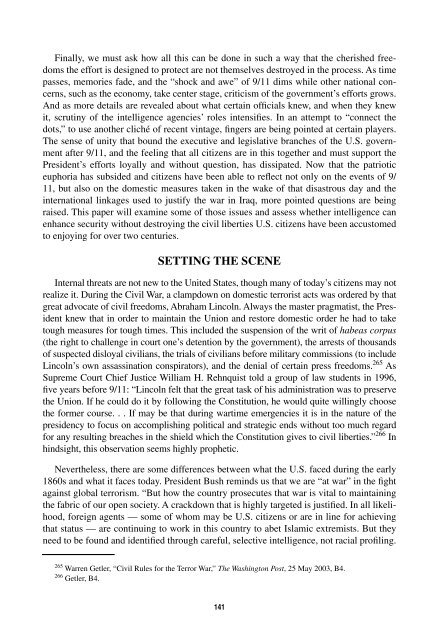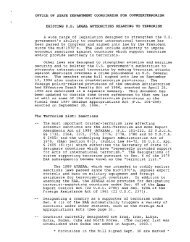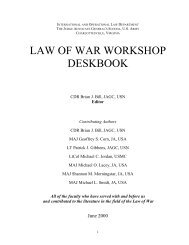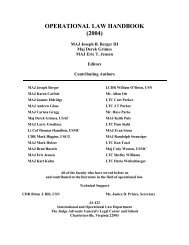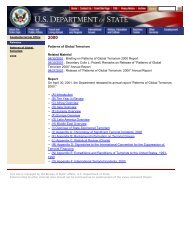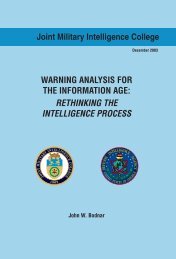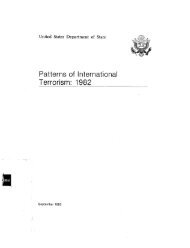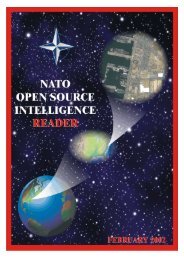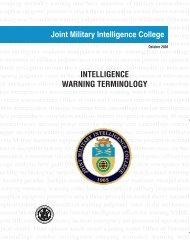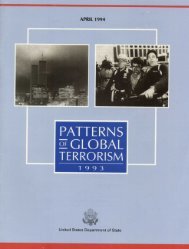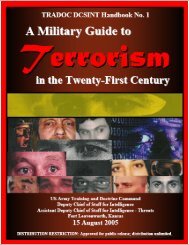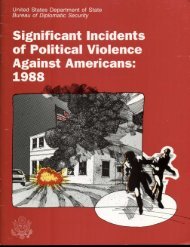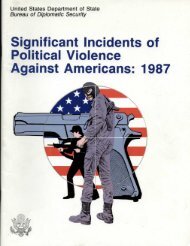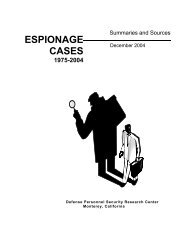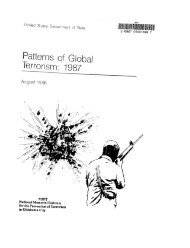learning with professionals - Higgins Counterterrorism Research ...
learning with professionals - Higgins Counterterrorism Research ...
learning with professionals - Higgins Counterterrorism Research ...
You also want an ePaper? Increase the reach of your titles
YUMPU automatically turns print PDFs into web optimized ePapers that Google loves.
Finally, we must ask how all this can be done in such a way that the cherished freedoms<br />
the effort is designed to protect are not themselves destroyed in the process. As time<br />
passes, memories fade, and the “shock and awe” of 9/11 dims while other national concerns,<br />
such as the economy, take center stage, criticism of the government’s efforts grows.<br />
And as more details are revealed about what certain officials knew, and when they knew<br />
it, scrutiny of the intelligence agencies’ roles intensifies. In an attempt to “connect the<br />
dots,” to use another cliché of recent vintage, fingers are being pointed at certain players.<br />
The sense of unity that bound the executive and legislative branches of the U.S. government<br />
after 9/11, and the feeling that all citizens are in this together and must support the<br />
President’s efforts loyally and <strong>with</strong>out question, has dissipated. Now that the patriotic<br />
euphoria has subsided and citizens have been able to reflect not only on the events of 9/<br />
11, but also on the domestic measures taken in the wake of that disastrous day and the<br />
international linkages used to justify the war in Iraq, more pointed questions are being<br />
raised. This paper will examine some of those issues and assess whether intelligence can<br />
enhance security <strong>with</strong>out destroying the civil liberties U.S. citizens have been accustomed<br />
to enjoying for over two centuries.<br />
SETTING THE SCENE<br />
Internal threats are not new to the United States, though many of today’s citizens may not<br />
realize it. During the Civil War, a clampdown on domestic terrorist acts was ordered by that<br />
great advocate of civil freedoms, Abraham Lincoln. Always the master pragmatist, the President<br />
knew that in order to maintain the Union and restore domestic order he had to take<br />
tough measures for tough times. This included the suspension of the writ of habeas corpus<br />
(the right to challenge in court one’s detention by the government), the arrests of thousands<br />
of suspected disloyal civilians, the trials of civilians before military commissions (to include<br />
Lincoln’s own assassination conspirators), and the denial of certain press freedoms. 265 As<br />
Supreme Court Chief Justice William H. Rehnquist told a group of law students in 1996,<br />
five years before 9/11: “Lincoln felt that the great task of his administration was to preserve<br />
the Union. If he could do it by following the Constitution, he would quite willingly choose<br />
the former course. . . If may be that during wartime emergencies it is in the nature of the<br />
presidency to focus on accomplishing political and strategic ends <strong>with</strong>out too much regard<br />
for any resulting breaches in the shield which the Constitution gives to civil liberties.” 266 In<br />
hindsight, this observation seems highly prophetic.<br />
Nevertheless, there are some differences between what the U.S. faced during the early<br />
1860s and what it faces today. President Bush reminds us that we are “at war” in the fight<br />
against global terrorism. “But how the country prosecutes that war is vital to maintaining<br />
the fabric of our open society. A crackdown that is highly targeted is justified. In all likelihood,<br />
foreign agents — some of whom may be U.S. citizens or are in line for achieving<br />
that status — are continuing to work in this country to abet Islamic extremists. But they<br />
need to be found and identified through careful, selective intelligence, not racial profiling.<br />
265 Warren Getler, “Civil Rules for the Terror War,” The Washington Post, 25 May 2003, B4.<br />
266 Getler, B4.<br />
141


